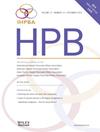新一代测序显示了肝细胞癌患者基因组谱的种族和性别差异:AACR GENIE项目分析
IF 2.4
3区 医学
Q2 GASTROENTEROLOGY & HEPATOLOGY
引用次数: 0
摘要
背景:尚未对肝细胞癌(HCC)患者中与种族和性别差异相关的基因组变异进行研究。我们试图描述HCC患者相对于种族和性别的突变景观。方法:使用美国癌症研究协会GENIE项目(v16.0)评估接受下一代测序的成年HCC患者(bb0 - 18岁)的基因组变异数据。在787个基因中发现了与种族和性别相关的变异。结果:在832例患者中,白人占60.8%,黑人占7.7%,亚洲人占12.4%(其他/未知:19.1%)。大多数患者有来自原发肿瘤的遗传数据(71.2%),而17.2%有转移性疾病序列(未知:11.6%)。TERT突变在白人(48.0%)和黑人(46.7%)比亚裔(23.4%)患者中更常见(q = 0.003),而TP53突变在亚裔(48.6%)比黑人(45.5%)或白人(33.1%)个体中更常见(q = 0.03)。TERT(46.1%对28.6%)和CTNNB1突变(47.7%对29.3%)在男性中比女性更容易发生(两者都是q结论:HCC患者突变谱的差异突出了临床试验中积累不同患者群体的重要性。本文章由计算机程序翻译,如有差异,请以英文原文为准。
Next-generation sequencing demonstrates racial and sex differences in genomic profiling of hepatocellular carcinoma patients: an AACR GENIE project analysis
Background
Genomic variations related to racial and sex differences among patients with hepatocellular carcinoma (HCC) have not been investigated. We sought to characterize the mutational landscape of patients with HCC relative to race and sex.
Methods
The American Association for Cancer Research GENIE project (v16.0) was used to assess data on genomic variations among adult patients (>18 years) with HCC who underwent next-generation sequencing. Variations in 787 genes were identified and characterized relative to race and sex.
Results
Among 832 patients, 60.8 % of individuals were White, 7.7 % Black, and 12.4 % Asian (other/unknown:19.1 %). Most patients had genetic data from the primary tumor (71.2 %), whereas 17.2 % had metastatic disease sequenced (unknown:11.6 %). TERT mutations occurred more frequently in White (48.0 %) and Black (46.7 %) versus Asian (23.4 %) patients (q = 0.003), while TP53 mutations were more common in Asian (48.6 %) versus Black (45.5 %) or White (33.1 %) individuals (q = 0.03). TERT (46.1 % vs. 28.6 %) and CTNNB1 mutations (47.7 % vs. 29.3 %) were more likely to occur in males than females (both q < 0.05). Marked variations in prevalence of other common genetic HCC mutations were noted across different races and sexes.
Conclusions
Differences in mutational profiles of HCC patients highlight the importance of accruing diverse populations of patients to clinical trials.
求助全文
通过发布文献求助,成功后即可免费获取论文全文。
去求助
来源期刊

Hpb
GASTROENTEROLOGY & HEPATOLOGY-SURGERY
CiteScore
5.60
自引率
3.40%
发文量
244
审稿时长
57 days
期刊介绍:
HPB is an international forum for clinical, scientific and educational communication.
Twelve issues a year bring the reader leading articles, expert reviews, original articles, images, editorials, and reader correspondence encompassing all aspects of benign and malignant hepatobiliary disease and its management. HPB features relevant aspects of clinical and translational research and practice.
Specific areas of interest include HPB diseases encountered globally by clinical practitioners in this specialist field of gastrointestinal surgery. The journal addresses the challenges faced in the management of cancer involving the liver, biliary system and pancreas. While surgical oncology represents a large part of HPB practice, submission of manuscripts relating to liver and pancreas transplantation, the treatment of benign conditions such as acute and chronic pancreatitis, and those relating to hepatobiliary infection and inflammation are also welcomed. There will be a focus on developing a multidisciplinary approach to diagnosis and treatment with endoscopic and laparoscopic approaches, radiological interventions and surgical techniques being strongly represented. HPB welcomes submission of manuscripts in all these areas and in scientific focused research that has clear clinical relevance to HPB surgical practice.
HPB aims to help its readers - surgeons, physicians, radiologists and basic scientists - to develop their knowledge and practice. HPB will be of interest to specialists involved in the management of hepatobiliary and pancreatic disease however will also inform those working in related fields.
Abstracted and Indexed in:
MEDLINE®
EMBASE
PubMed
Science Citation Index Expanded
Academic Search (EBSCO)
HPB is owned by the International Hepato-Pancreato-Biliary Association (IHPBA) and is also the official Journal of the American Hepato-Pancreato-Biliary Association (AHPBA), the Asian-Pacific Hepato Pancreatic Biliary Association (A-PHPBA) and the European-African Hepato-Pancreatic Biliary Association (E-AHPBA).
 求助内容:
求助内容: 应助结果提醒方式:
应助结果提醒方式:


